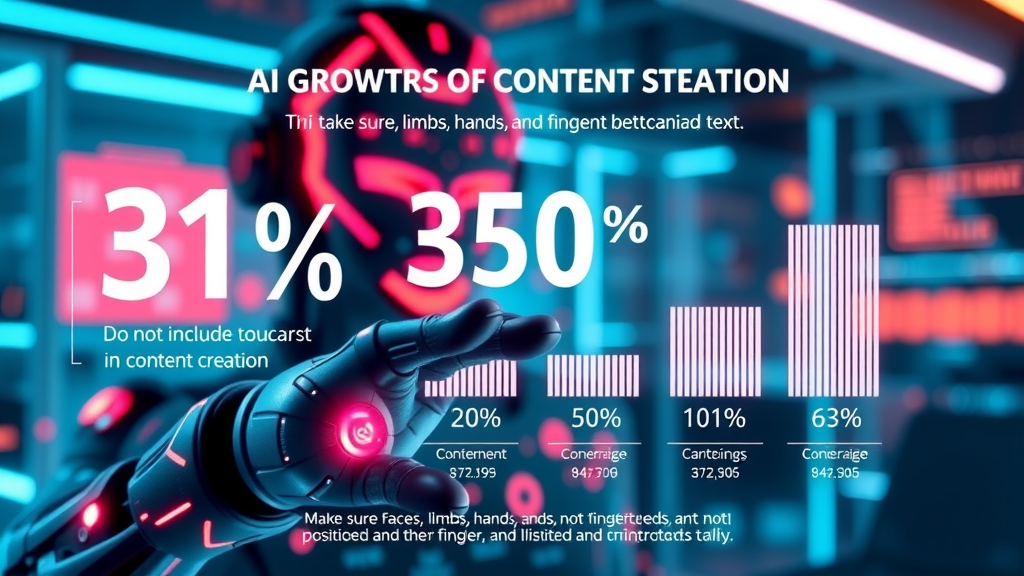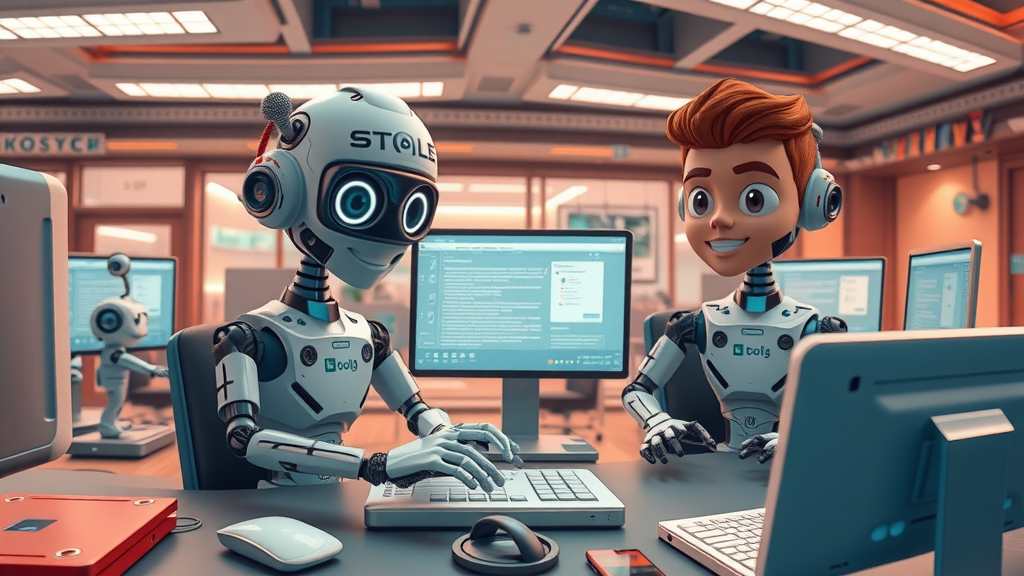With artificial intelligence now pivotal in diverse sectors, it’s revolutionizing content creation. According to recent reports, businesses leveraging AI tools witnessed over 40% growth in content production efficiency. This educational guide unpacks these transformative impacts on content creation automation, revealing the steps to seamlessly integrate AI into your workflow and accelerate your digital marketing strategies.
The Growing Impact of AI in Content Creation
AI has transmogrified the landscape of content creation, ushering a paradigm shift where traditional methods are augmented by advanced machine-learning algorithms. This shift is not only improving efficiency but also fostering innovation within the digital marketing ecosystem. By automating mundane tasks and furnishing novel insights, AI has elevated the quality and output of media content across platforms.
Businesses have realigned their content strategies to incorporate AI, benefitting from enhanced precision and speed. AI tools enable content creators to generate personalized content at scale, maximizing engagement and reach. Imagine an AI-driven tool that suggests topics, optimizes SEO, and schedules media posts, all while learning and adapting to real-time data. This intelligent content automation is transforming the way brands communicate with their audiences.
Statistics Highlighting AI's Role

Statistics reveal AI is fueling a significant increase in efficiency and creativity within content creation frameworks. A survey conducted by a global digital marketing agency illustrates that brands utilizing AI have witnessed a 55% reduction in time spent on content generation. Such advancements not only streamline the creation process but also enrich content strategies by delivering insights into audience behavior and preferences, thus creating more resonant media content.
Unconventional Facts on AI Usage
Some unconventional facts underline AI's omnipresence in content creation and beyond. Did you know AI algorithms are now capable of predicting trending topics before they go viral? Additionally, AI can now mimic human-like writing styles, bringing a subtle human touch to automated content that was once considered mechanical. These capabilities empower content creators to bridge the gap between technology and human emotion, delivering content that resonates on a deeper level.
Understanding AI Tools for Content Creation
The arsenal of tools available for AI content creation is robust, each with unique features optimized for various facets of the content creation process. This section delves into key features that underpin these revolutionary tools, along with comparisons of the leading solutions on the market.
Key Features of AI Content Tools
AI content tools come equipped with features that cater to diverse content creation needs. Prominent among these is natural language processing (NLP), which enhances the AI's understanding and generation of quality content. Automation tools are adept at content generation, optimizing structure, and improving readability, all while maintaining a consistent tone.
The integration of AI in content strategy has enabled sophisticated analytics that interpret data trends, guiding creators towards what fully resonates with their audience. Beyond analytics, AI content tools also provide predictive capabilities, helping strategists anticipate audience reactions and make informed decisions.
Comparing Top AI Tools for Content Generation

When comparing AI tools for content generation, one must assess factors like interface friendliness, integration capabilities, and cost-effectiveness. Notable players in this realm include OpenAI’s GPT-3 for its expansive language generation abilities and Jasper.ai for tailored blog posts and social media suggestions.
Furthermore, platforms like ContentBot offer creative ideation functionalities, while Copy.ai provides intuitive content creation targeted at different campaign needs. Evaluating these tools involves dissecting these aspects and understanding which tool can best optimize your media content strategies.
The Process of Content Creation Automation
Implementing AI for content creation is more than just adopting technology; it involves redefining your content creation process towards a more data-driven and adaptive framework. Discover how to implement AI tools to revitalize your content strategy and enhance efficiency.
Steps to Implement AI in Content Strategy
To integrate AI into your content strategy, begin by identifying areas where automation can replace manual efforts without sacrificing quality. Evaluate current workflows and pinpoint processes like content curation, SEO optimization, and data analysis for potential automation.
Developing a strategic content plan is crucial, focusing on objectives such as improving engagement, streamlining production, and expanding reach. Choose AI tools that align with these goals, and develop benchmarks to measure their impact. This systematic integration ensures that AI augments, rather than disrupts, existing workflows, providing a seamless transition into modern content creation paradigms.
Automation Tools for Effective Content Production
Automation tools represent the backbone of efficient content production processes, enabling creators to scale their efforts without exponential resource investment. These tools range from basic template-driven engines to sophisticated predictive analytics platforms, each playing a role in content ideation and generation.
Their utility is evident in automating repetitive tasks, such as scheduling, optimizing, and publishing media posts, freeing creators to focus on strategic tasks that require the human touch. Moreover, these tools' ability to generate actionable insights derives from leveraging vast amounts of data, carving a path towards more targeted and impactful content.
AI's Role in Social Media Content Creation
AI is pivotal in crafting compelling social media campaigns, infusing automation into various elements of content creation, from ideation to distribution. AI tools analyze vast social media landscapes to highlight trends and propose content ideas that align with audience interests.
By optimizing post times, selecting trending topics, and generating engaging captions, AI fine-tunes media posts to maximize visibility and interaction. This bolsters social media strategies by ensuring content remains timely, relevant, and aligned with ever-evolving audience preferences.
AI Tools for Blog Post Automation

AI is a game-changer in blog post automation, revolutionizing how content is produced and consumed. Tools such as QuillBot and Writesonic offer sophisticated algorithms that assist in drafting, proofreading, and optimizing content with ease. These platforms cater to specific niches, providing customized solutions that enhance content strategy and resonate with particular audiences.
Furthermore, AI enhances blog production by fine-tuning pillars like SEO, meta descriptions, and readability scores, ensuring every generated piece meets high-standard benchmarks. This amalgamation of technology and creativity is where AI truly shines, offering content creators powerful resources to amplify their blogging endeavors.
Benefits and Challenges of AI in Content Generation
Advantages of Using AI in Content Creation
Embracing AI in content creation provides multiple benefits, including increased productivity, enriched creativity, and enhanced personalization. AI tools empower creators to produce high volumes of content quickly without compromising quality. Moreover, these tools aid in exploring innovative approaches, infusing fresh perspectives into traditional content types.
- Efficiency and Consistency —AI maintains a steady production of high-quality content, ensuring brand consistency across all outputs.
- Enhanced Creativity and Innovation —AI derives insights from broad datasets, sparking new ideas and creative solutions.
- Personalized and Targeted Content —Customized recommendations ensure that audiences receive content that speaks directly to their interests and needs.
Common Challenges and How to Overcome Them
While AI offers remarkable benefits, creators must confront several challenges, such as algorithmic bias, the need for continuous human oversight, and cost implications. AI tools, though powerful, sometimes require a human touch to preserve the relational dynamics inherent in certain types of content.
To overcome these challenges, it is crucial to maintain a balance between automation and creativity. Regularly audit AI-generated content to ensure it aligns with brand values and audience expectations. Additionally, investing in AI literacy and skill development can vastly improve the integration of AI into existing content workflows, allowing for a more seamless transition.

People Also Ask: How to Automate Content Creation Using AI?
Step-by-Step Guide to AI-Driven Content Automation
Automating content creation with AI begins with selecting the right tools tailored to your needs. Begin by clearly defining content goals—whether increasing engagement, achieving greater outreach, or optimizing existing creation processes. Then, assess AI tools for their ability to integrate smoothly into your strategy.
Once AI tools are implemented, maintain a feedback loop where AI can continue learning and refining the content strategy. This ensures content remains dynamic and adjusts to changing consumer patterns and preferences. Lastly, ensure there is regular analysis of AI outputs, setting new objectives based on insights gathered from automated campaigns.
People Also Ask: How Can AI Be Used for Automation?
Applications of AI in Different Sectors
AI’s applications extend beyond content creation into varied sectors, including but not limited to finance, healthcare, and customer service. In finance, AI assists in predictive analytics for market trends, while in healthcare, AI enhances diagnostics and patient care through robust data analysis. Customer service sees AI in chatbots that deliver prompt and accurate responses, improving user experiences.
People Also Ask: Which AI Model is Used for Content Creation?
Popular AI Models in Content Automation
Several AI models are at the forefront of content automation, each offering unique capabilities tailored to specific content strategies. OpenAI’s GPT-3, renowned for its advanced language processing, can generate human-like text, suitable for applications ranging from digital marketing to writing personalized content.
Other AI models like BERT are crucial for semantic understanding, refining content by ensuring context and nuance are preserved. These tools exemplify how AI can bridge technology and linguistics, optimizing content quality and engagement.

People Also Ask: How to Use AI for Content Writing?
Top AI Tools for Enhancing Content Writing
AI tools like Grammarly and Copysmith are enhancing content writing by providing comprehensive editing, ideation, and optimization services. Grammarly excels in correcting grammatical errors and enhancing readability, while Copysmith supports rapid content creation with input prompts that lead to engaging social media posts and web content.
Best Practices for AI-Assisted Writing
For optimal AI-assisted writing, it is essential to maintain active involvement in the content creation process, using AI not as the sole creator but as a collaborative assistant. Best practices involve setting clear directives and refining AI input to match brand tone and style.
Regular calibration and review of AI-generated content keep it aligned with strategic goals, ensuring quality content without losing the human touch. This approach studios a balance between innovation and authenticity in content creation endeavors.
Conclusion
Summarizing the Impact of AI on Content Creation
AI has fundamentally reshaped content creation, enabling efficiency and innovation through advanced tools while presenting challenges that require nuanced balancing.
Future Trends in AI Content Automation
The future heralds further sophistication in AI tools, offering comprehensive automation solutions across diverse media landscapes. Check out the accompanying video for insights from industry experts on AI's evolving role in content automation.
“AI is not just a tool; it’s a new way of thinking about content creation.”
FAQs
- How is AI influencing personalized content? AI enhances content personalization by analyzing user data to deliver more relevant and engaging experiences.
- What challenges might one face with AI integration? Challenges include maintaining creativity, addressing bias, and the cost of implementing sophisticated AI systems.
- How can AI-driven automation benefit content marketing? AI streamlines content marketing through efficient data analysis, trend prediction, and automated scheduling, boosting overall strategy effectiveness.
- Steps for Successful AI Integration into Content Workflows:
- Identify the Right AI Tools for Your Needs
- Develop a Strategic Content Plan
 Add Row
Add Row  Add
Add 




Write A Comment